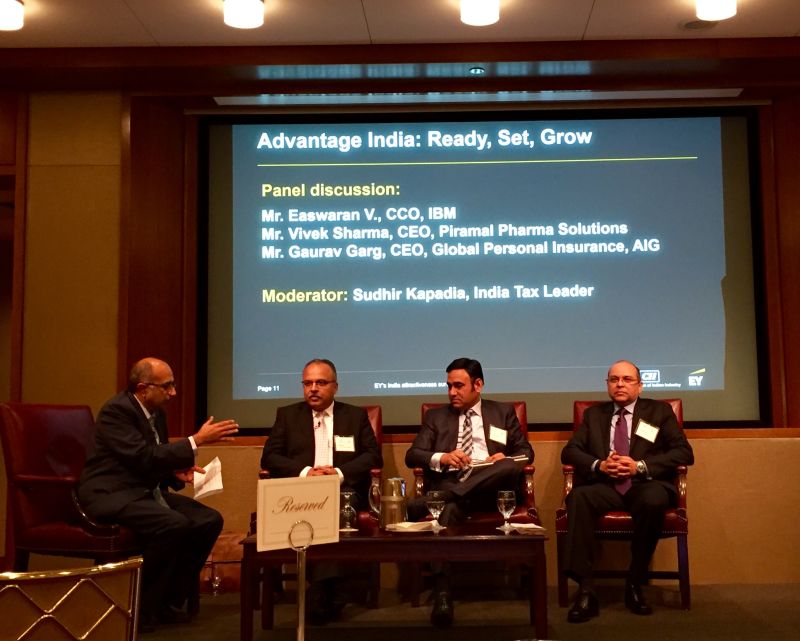
A recent survey conducted by the Ernst & Young (E&Y) reveals India as the top Foreign Direct Investment (FDI) destination in the first half of 2015. The E&Y survey titled “Ready, Set, Grow: EY’s 2015 India Attractiveness Survey,” showed an increase in investor interest in the country.
About 500 global leaders from various organizations worldwide were a part of this survey. Of this 32 percent voted India as the most attractive FDI destination.
Sudhir Kapadia, Partner & National Tax Leader EY India, spoke to CNBC-TV18’s Reema Tendulkar and said that “the people who were polled do believe that there is a far greater economic and political stability.”
“Economic because the direction is pretty clear, the messages are very uniformly given by various government officials to them and indirectly as well,” he said.
Kapadia added that “themes, which the central government has been talking about, (like) Make in India, Skill India and the rest do resonate.” This, he said, has helped lift business sentiments. In the survey, 89 percent of voters said that infrastructure and the government’s Smart City mission would add significantly to India’s growth.
Besides this, global factors like oil prices dip and the Reserve Bank’s conservative policy has helped India stand out. Another thing that has worked for the country is that after China, where investors have already invested heavily, look at India as the next market with “decent return in the foreseeable future.”
On the burning topic of the Goods & Services Tax (GST) recommendations submitted by the Chief Economic Advisor Arvind Subramanian to Finance Ministry on Friday, Kapadia said that the government is not wanting to have GST as a culprit should there be an increase in prices by companies and providers of services.
“These recommendations, if accepted, I don’t see any plausible reason why the opposition should not now support the constitutional amendment in the Rajya Sabha,” he added.
Below is the transcript of Sudhir Kapadia’s interview with CNBC-TV18’s Reema Tendulkar.
Q: You have polled 500 global leaders, 32 percent of them have ranked India as the most attractive destination. What were the key parameters and what is making India so attractive?
A: There are three or four factors, one is the people who were polled do believe that there is a far greater economic and political stability. Economic because the direction is pretty clear, the messages are very uniformly given by various government officials to them and indirectly as well.
Also the themes which the central government has been talking about, Make in India, Skill India and the rest do resonate and therefore I think in terms of sentiments as far as business goes, I think that is one very important factor.
The other is, of course, on the flip side. India has been fortunate as we know amongst BRIC countries we do standout currently. The oil prices dip has helped us and the conservative policies of the Reserve Bank of India (RBI) and our finance ministry has also helped us because we are not exposed to foreign currency loans like other BRIC countries. So, that has been a favourable factor as well.
The last thing which clearly investors, as we see, are responding positively to India is that, the world has gone ahead and invested very heavily in China. So, there is a certain inflection point now and if they have to look around and say which is the next market where we can hope to make a decent return in the foreseeable future, there is no other as big, as deep and as promising as India is.
Q: We have moved forward on the GST reform bill yesterday with the CEA panel submitting its recommendations. It involves three different rate bands, how do you expect the industry to react to these proposed rates?
A: It should come as a very pleasant surprise to everyone, the supporters, the cynics as well as the fence sitters because right from the time this 27 percent rate was bandied about for a while, the government has been painstakingly saying that this 27 percent is not what we have accepted. Then, of course, you had the Congress party maintaining that it should be 18 percent.
So, I think the current design if accepted, and I don’t see any reason why it should not be, then it should be a clear indication that the government is not wanting to have GST as a culprit should there be an increase in prices by companies and providers of services and optically also ensuring that everybody especially the consumers at large feel comforted that ultimately their tax burden is not materially increasing from what it was when you had all these variety of taxes.
I also think that the recommendation to remove the 1 percent inter-state goods movement tax is welcome. The government should readily accept this as well and should just do away with this and compensate the states in any case, which they are willing to do. I dare say that these recommendations if accepted I don’t see any plausible reason why the opposition should not now support the constitutional amendment in the Rajya Sabha.
If you ask me this was part of one of the important question in the India attractiveness survey. I am absolutely sure that most investors in India are looking eagerly at how the GST reforms pan out. I think all parties should now support this bill, time is really up to get this implemented.